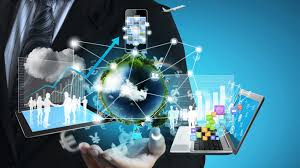Introduction: In the past few decades, technological advancements have significantly altered the way we live and work. From artificial intelligence (AI) to blockchain and the Internet of Things (IoT), the rise of emerging technologies is transforming industries, reshaping job markets, and influencing everyday life. In this article, we explore some of the most promising technologies and their potential impact on the future of business and society.
- Artificial Intelligence (AI) and Machine Learning: The Rise of Intelligent Systems
AI and machine learning have made remarkable strides in recent years, enabling businesses to automate processes, improve decision-making, and enhance customer experiences. AI refers to machines that can simulate human intelligence, while machine learning focuses on algorithms that allow systems to learn from data and improve over time.
Applications in Business: AI is revolutionizing industries such as healthcare, finance, and retail. From predictive analytics to automated customer support, businesses are increasingly relying on AI to increase efficiency and reduce costs.
Machine Learning in Action: Machine learning models help businesses detect fraud, recommend products, and optimize supply chains based on historical data and patterns.
Impact: AI and machine learning are improving productivity, reducing human error, and enabling more personalized services. However, they also raise questions about job displacement and the ethical implications of AI systems.
- Blockchain: Decentralized Solutions for Transparent Transactions
Blockchain technology, the backbone of cryptocurrencies like Bitcoin and Ethereum, is a decentralized, distributed ledger that securely records transactions across multiple computers. It has the potential to disrupt various industries, including finance, supply chain management, and healthcare.
Applications in Finance: Blockchain enables secure, fast, and cost-effective transactions without the need for intermediaries such as banks. This technology is also powering decentralized finance (DeFi) platforms, which allow users to lend, borrow, and trade cryptocurrencies without traditional financial institutions.
Blockchain in Supply Chain Management: Blockchain’s transparency and immutability make it ideal for tracking products across supply chains, ensuring the authenticity of goods and reducing fraud.
Impact: Blockchain technology could significantly enhance security, transparency, and efficiency in various industries. However, scalability and regulatory challenges remain as major barriers to widespread adoption.
- Internet of Things (IoT): Connecting the World Around Us
The Internet of Things refers to the interconnection of everyday devices and systems, allowing them to collect and exchange data. From smart home appliances to wearable health trackers, IoT is revolutionizing how people interact with technology.
IoT in Healthcare: IoT devices, such as smartwatches and wearable health monitors, enable continuous health monitoring, improving patient outcomes and reducing healthcare costs.
Smart Cities: IoT is powering the development of smart cities, where sensors and connected devices help manage traffic, monitor air quality, and optimize energy consumption.
Impact: IoT is making everyday life more convenient and efficient, but it also raises concerns around data privacy and cybersecurity as more devices become connected to the internet.
- 5G Technology: The Next Generation of Connectivity
5G technology is the fifth generation of mobile networks, offering faster speeds, lower latency, and the ability to connect a massive number of devices simultaneously. It is expected to accelerate innovation across multiple sectors, from telecommunications to manufacturing.
Faster Speeds and Lower Latency: 5G offers download speeds that are up to 100 times faster than 4G, making it possible to stream high-definition video, play online games, and use cloud-based applications with minimal delay.
Applications in Industry: 5G is set to revolutionize industries such as healthcare, manufacturing, and transportation by enabling real-time communication between devices, autonomous vehicles, and remote surgeries.
Impact: 5G will enable new possibilities for innovation, driving advancements in IoT, AI, and autonomous systems. However, widespread 5G deployment requires significant infrastructure investment.
- Quantum Computing: Solving Problems Beyond Traditional Computers
Quantum computing is a rapidly developing field that harnesses the principles of quantum mechanics to process information in ways that classical computers cannot. Quantum computers have the potential to solve complex problems, such as simulating molecular interactions or optimizing logistics, much faster than conventional supercomputers.
Applications in Science and Healthcare: Quantum computing could revolutionize drug discovery, help researchers understand complex biological systems, and create new materials with unique properties.
Business Applications: Industries such as logistics, finance, and manufacturing could benefit from quantum computing’s ability to optimize processes, improve predictions, and analyze massive datasets.
Impact: While quantum computing holds incredible potential, it is still in its early stages. Widespread adoption is likely years away, but its development will shape the future of technology and innovation.
- Augmented Reality (AR) and Virtual Reality (VR): Changing the Way We Experience the World
AR and VR technologies are increasingly being used to enhance consumer experiences and offer new ways of interacting with digital content.
Virtual Reality (VR): VR immerses users in fully digital environments, offering applications in gaming, entertainment, and education. VR is also being used for training simulations in industries such as aviation and medicine.
Augmented Reality (AR): AR overlays digital content onto the real world, enhancing how we interact with physical objects. Popular applications include AR gaming (like Pokémon GO), virtual try-ons for clothing and makeup, and interactive product displays.
Impact: AR and VR are creating more immersive and interactive experiences, but widespread adoption is still limited by the need for specialized hardware and high-quality content.
Conclusion:
Emerging technologies are set to redefine the future of business and society. From AI and blockchain to IoT, 5G, and quantum computing, these innovations are transforming industries, creating new opportunities, and improving the way we live and work. As these technologies continue to evolve, businesses must stay informed and adaptable, embracing the potential of these tools while navigating the challenges they present. The future of technology is exciting, and the possibilities are endless.

